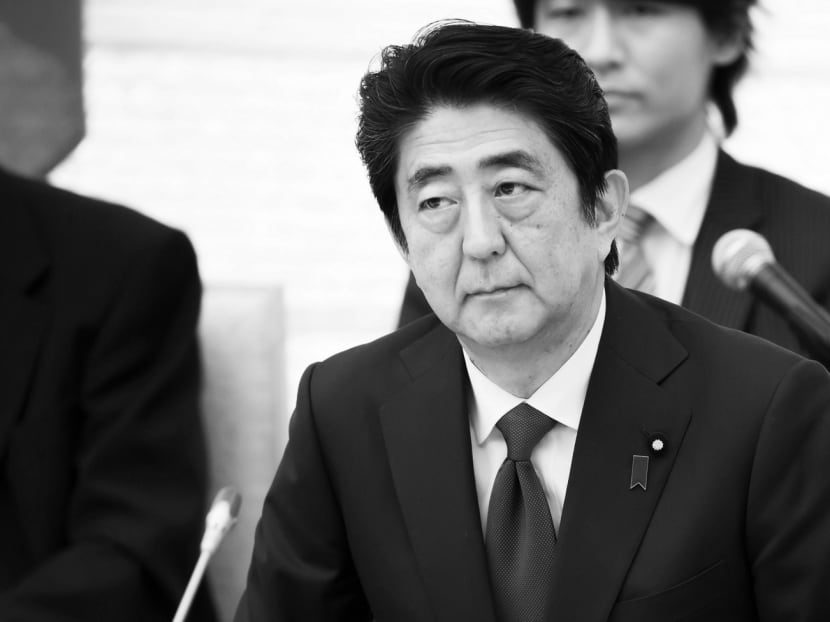Japan’s casino Bill leaves Abenomics in uncharted territory
There is probably a perfect time for a politician to close his eyes and chant a 1,000-year-old Buddhist sutra. The middle of a pivotal national debate on casino legalisation is not necessarily it.

Japanese Prime Minister Shinzo Abe emerges from the passage of the casino Bill looking more muscular but with weaknesses more starkly exposed. He has thrown his weight behind gaming and effected a big historic change, but in a way that detracts from his image as a brave reformer. Photo: REUTERS
There is probably a perfect time for a politician to close his eyes and chant a 1,000-year-old Buddhist sutra. The middle of a pivotal national debate on casino legalisation is not necessarily it.
But the spirited recital by the ruling Liberal Democratic party’s (LDP) Yaichi Tanigawa was just one of many oddities of a 10-day parliamentary whirlwind that has laid the groundwork for a potential US$40 billion (S$57.8 billion) gaming market, and blown Japan’s Prime Minister and his faltering Abenomics project into unmapped territory.
Mr Shinzo Abe emerges from the passage of the casino Bill looking more muscular but with weaknesses more starkly exposed. He has thrown his weight behind gaming and effected a big historic change, but in a way that detracts from his image as a brave reformer.
The show of strength on casinos was quite something, however. Some 17 years have passed since casino legalisation was first seriously proposed in Japan. For most of those, the prospect of anything actually happening seemed remote. Poll after poll show casinos remain deeply unpopular with the Japanese public — a survey conducted on the eve of the first of several parliamentary votes on the subject this month showed support at just 12 per cent.
There are also, some would argue, more pressing issues for Japan’s parliament to debate in its final session of a year such as 2016, and substantive parts of the Abenomics reform momentum (“womenomics” being a prime example) appear lost. But Mr Abe, cheerleading a clique of pro-casino MPs and industry lobbyists, has pushed casino legalisation from notion to reality with astounding speed.
On one view, it was a piece of simple “because I can” steamrollering. Upper House elections earlier this year gave Mr Abe undisputed control of Japanese politics, making this sort of tour de force possible. For those who assume (and worry) that Mr Abe plans to use his strength to fiddle with Japan’s pacifist Constitution, this was unnerving.
Doubly so, perhaps, because the casino affair confirms that he faces no serious opposition in parliament. Mr Tanigawa had time for his sutra-based antics because the Democratic party of Japan members were boycotting the session that had been set aside for them to cross-examine the government on the ethical justification for casinos, and everyone else had run out of questions.
Other tactics by the opposition, including several motions of no confidence against the Prime Minister, were brushed aside with a contempt that the LDP has not been able to exercise for some time, but that Mr Abe has clearly taken to. As the political analyst Tobias Harris puts it: The parliamentary norms that once protected minority voices and raised the stakes of debate have been eroded.
The general public have hardly been much more activist or threatening, either. Protest turnouts against other controversial legislation that Mr Abe has rammed through over the past 18 months — notably the Trans-Pacific Partnership trade deal and new security laws — have been small enough to ignore.
The problem here is that Mr Abe has, perhaps deliberately, made it all look a bit too easy. One of the many striking features of the casino debates was the preparedness of the LDP to twist the arm of Komeito, its coalition partner and a party strongly opposed to gambling. Political analysts speculate that Mr Abe may face a high cost for having done so.
The public approval rating for Mr Abe’s Cabinet fell from 60.7 per cent in November to 54.8 per cent in December, according to a poll by the Kyodo news agency released on Sunday.
But the most obvious question raised by the lightning passage of the casino Bill and all the implied political clout is “What next?”. Will this proven ability to make laws the public does not support translate into tackling vested interests and seriously powerful groups like the business lobby?
Casinos — which Japan’s massive economy does not, in fact, require — were a useful distraction from an otherwise emptying pot of ideas. It is far from clear that Mr Abe has any compelling measures in mind to restore his economic revival narrative. Even the fairly straightforward stuff may be tricker now.
A revived Abenomics campaign to convince Japanese households to move their vast savings from bank deposits to steady investment, for example, may ring especially hollow after the passage of a Bill that will ultimately encourage them to bet on the turn of a card or roulette wheel. FINANCIAL TIMES
ABOUT THE AUTHOR:
Leo Lewis is Tokyo Correspondent for the Financial Times.






